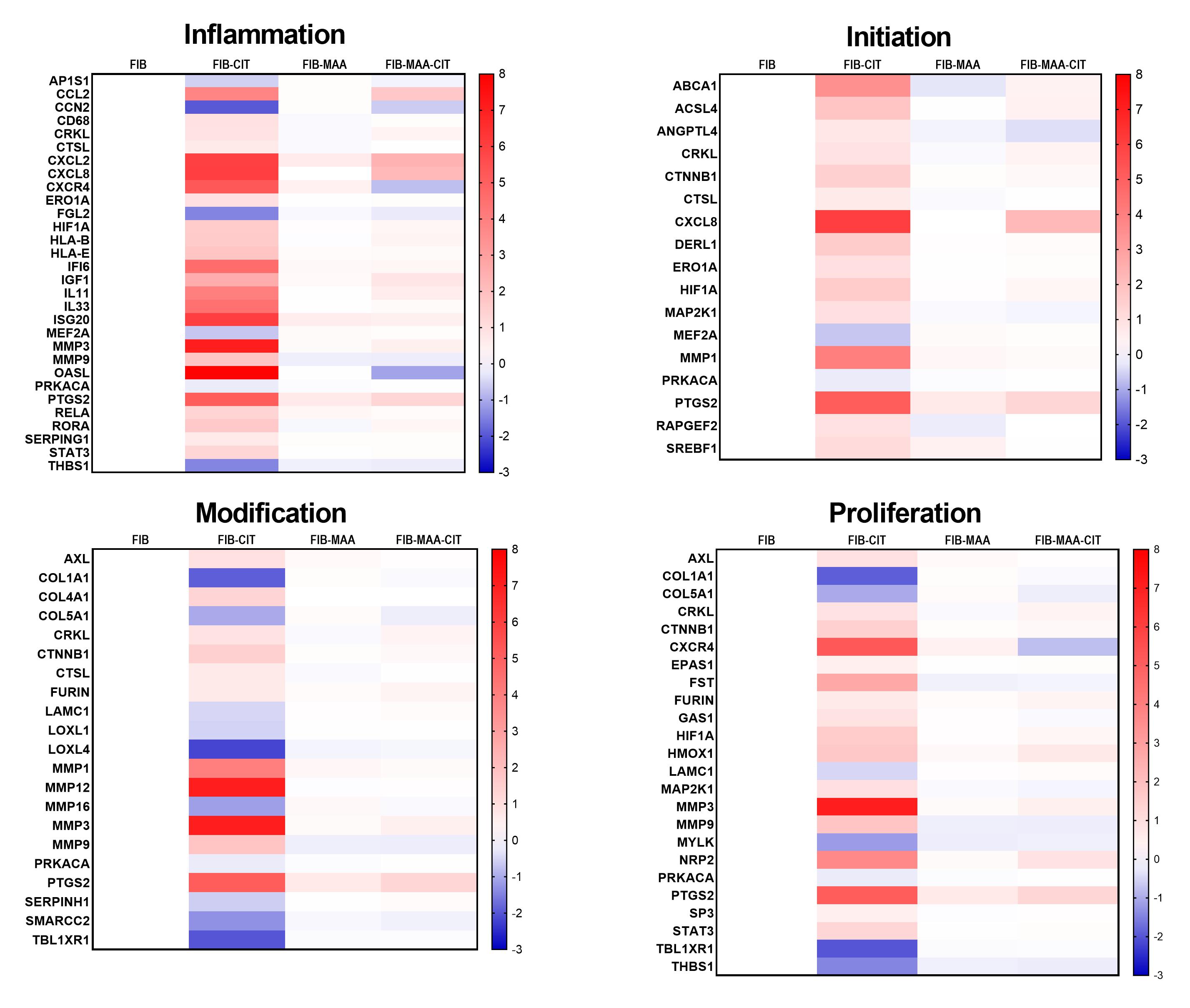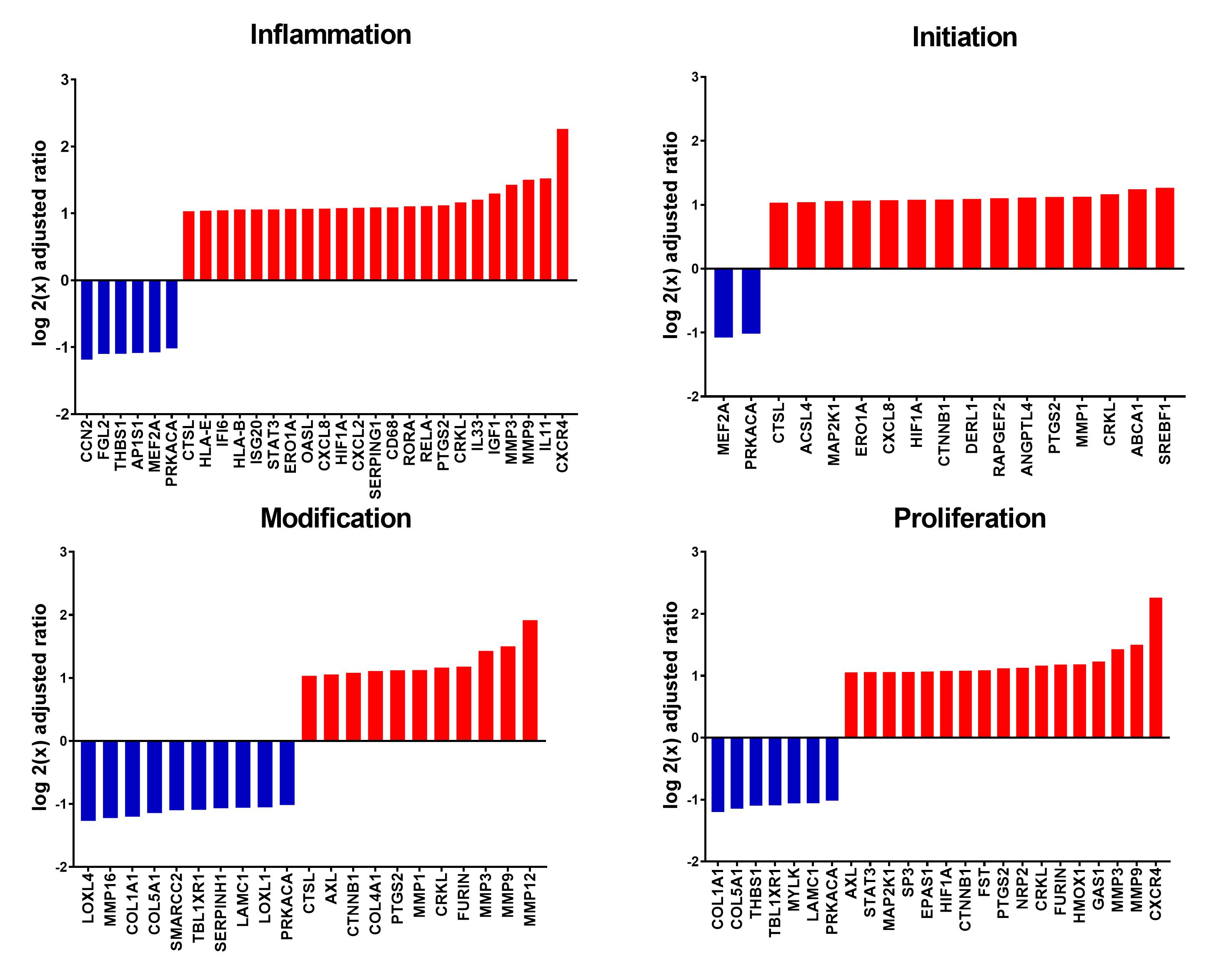Session Information
Session Type: Poster Session A
Session Time: 8:30AM-10:30AM
Background/Purpose: The pathophysiology of rheumatoid arthritis (RA) is hallmarked by joint inflammation, thickening of the pannus, and resultant joint destruction. Within the synovial tissue, citrullinated antigens and malondialdehyde-acetaldehyde (MAA)-modified proteins co-localize, implicating a potential synergistic role in the induction of immune and pro-fibrotic responses. To further elucidate the mechanisms by which these modifications contribute to RA pathogenesis, we studied fibrotic gene expression by human fibroblast-like synoviocytes from RA patients (HFLS-RA) in response to stimulation with citrullinated and/or MAA-modified fibrinogen.
Methods: HFLS-RA cells were treated with native fibrinogen versus citrullinated and/or MAA-modified fibrinogen for 8 hours with sham treated HFLS-RA cells as reference, and mRNA was isolated. Expression of 763 genes was quantified using the NanoString® nCounter® Human Fibrosis Panel. Comparisons of gene expression across treatment groups were performed using differential expression analysis. Only genes with increased or decreased expression compared to untreated HFLS-RA cells were reported in the final results. Data was reported using log2 of normalized ratio with the sham group as reference.
Results: The gene responses of treated HFLS-RA cells were categorized based on their role in the fibrotic pathway (inflammation, initiation, modification, and proliferation) with many genes having influence on multiple pathways. Of the 763 genes analyzed, 58 demonstrated differential expression when exposed to modified antigen (Figure 1). Forty genes exhibited significantly increased expression when treated with citrullinated-fibrinogen alone compared to native unmodified fibrinogen (Figure 2). Of these 40 genes, four also demonstrated increased expression after treatment with fibrinogen co-modified with citrulline and MAA (Figure 3). One gene, CCL2 (inflammation), yielded increased gene expression in response to co-modified fibrinogen but not to citrullinated antigen alone (Figure 3). Treatment with MAA-modified fibrinogen alone did not generate any significant differential expression.
Conclusion: In this study, citrullinated fibrinogen augmented gene expression most conspicuously, whereas MAA-modification alone did not. Interestingly, co-modification did demonstrate a synergistic pro-fibrotic synovial response in one gene (CCL2) that was not seen with either single modification alone. Many of the genes identified have previously been shown to correlate with anti-citrullinated antibodies and RA disease activity, and thus, these post-translationally modified proteins may play a role in the development of fibrosis that contributes to joint pathology in RA. We would benefit from further elucidation of the synergistic role MAA and citrulline play and if that could be a target of diagnostic and/or therapeutic clinical practice.
To cite this abstract in AMA style:
Maloley P, Ryan E, Aripova N, Duryee M, England B, Mikuls T, Thiele G. Citrullination Drives the Expression of Pro-fibrotic Genes in Rheumatoid Arthritis Fibroblast-like Cells [abstract]. Arthritis Rheumatol. 2021; 73 (suppl 9). https://acrabstracts.org/abstract/citrullination-drives-the-expression-of-pro-fibrotic-genes-in-rheumatoid-arthritis-fibroblast-like-cells/. Accessed .« Back to ACR Convergence 2021
ACR Meeting Abstracts - https://acrabstracts.org/abstract/citrullination-drives-the-expression-of-pro-fibrotic-genes-in-rheumatoid-arthritis-fibroblast-like-cells/



